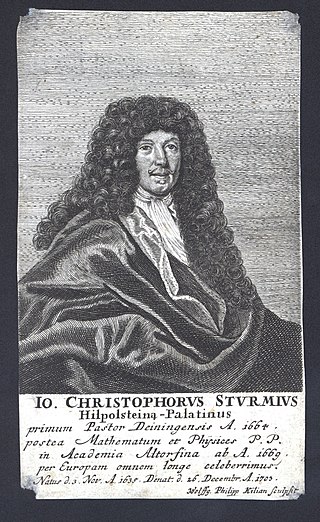Top Qs
Timeline
Chat
Perspective
Johann Sturm
German philosopher (1635–1703) From Wikipedia, the free encyclopedia
Remove ads
Johann Christoph Sturm (3 November 1635 – 26 December 1703)[1] was a German philosopher, professor at University of Altdorf and founder of a short-lived scientific academy known as the Collegium Curiosum, based on the model of the Florentine Accademia del Cimento.[2] He edited two volumes of the academy's proceedings under the title Collegium Experimentale (1676 and 1685).[2] In 1670, he translated the works of Archimedes into German.[1]
Sturm is the author of Physica Electiva (1697), a book that criticized Gottfried Wilhelm Leibniz and prompted him to publish a rebuke. Sturm's critique was aimed at Leibniz's view that Nature and/or its constituent parts possess some creative force of their own. This criticism was partly theological, in that Sturm claimed Leibniz's view of Nature undermined the sovereignty of the Christian God.[3]
Remove ads
Works
- Collegium experimentale, Nuremberg: Endter, vol. 1 (1676), available here and here; vol. 2 (1685) available here, here, and here.
- Physica electiva sive hypothetica, vol 1, Nuremberg: Endter, 1697, available here and here; vol.2, Altdorf: Kohles, 1698.
As well as the following: [4]
- Mathesis Juvenilis
- Physica Modernae Compendium
- Praelectiones Academicae
- A list of works by Sturm with links to online versions is available at Astronomie in Nürnberg, section "Ausgewählte Werke".
- Illustratiom from Excerpta ex literis... published in Acta Eruditorum, 1690
- Physica electiva sive hypothetica
Remove ads
Further reading
- Ahnert, Thomas (2002), The Culture of Experimentalism in the Holy Roman Empire: Johann Christoph Sturm (1635-1703) and the Collegium Experimentale Archived 2020-06-06 at the Wayback Machine.
- Wiesenfeldt, Gerhard, "Speculative and Experimental Philosophy in Universities: Eclecticism Archived 2011-08-09 at the Wayback Machine", Early Modern Experimental Philosophy, 6 December 2010.
- A philosophical and mathematical dictionary by Charles Hutton[5]
- The Biographical Treasury by Samuel Maunder[6]
- John Gorton's General Biographical Dictionary[7]
- Alexander Chalmers' General Biographical Dictionary[4]
Remove ads
References
External links
Wikiwand - on
Seamless Wikipedia browsing. On steroids.
Remove ads



